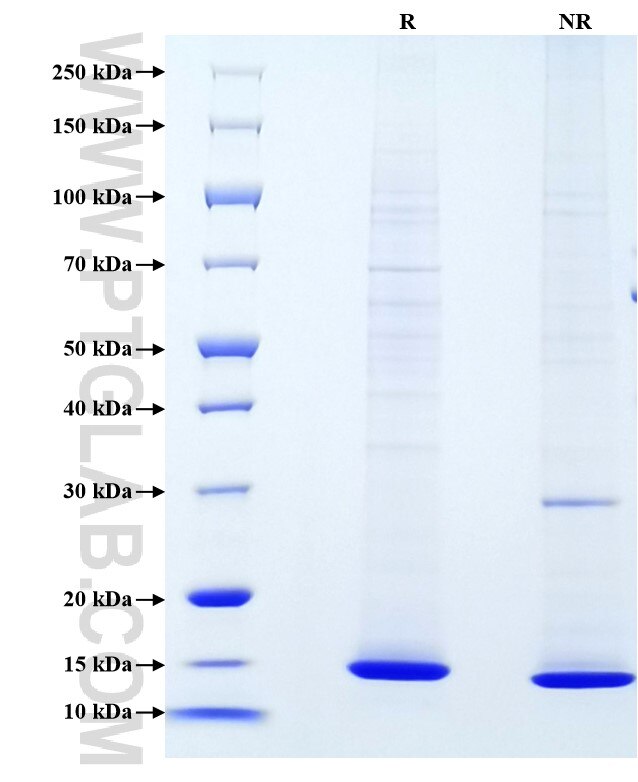Recombinant Rat Leptin protein (His Tag)
Species
Rat
Purity
>90 %, SDS-PAGE
Tag
His Tag
Activity
not tested
Cat no : Eg0892
Validation Data Gallery
Product Information
| Purity | >90 %, SDS-PAGE |
| Endotoxin | <0.1 EU/μg protein, LAL method |
| Activity |
Not tested |
| Expression | HEK293-derived Rat Leptin protein Val22-Cys167 (Accession# P50596) with a His tag at the N-terminus. |
| GeneID | 25608 |
| Accession | P50596 |
| PredictedSize | 17.2 kDa |
| SDS-PAGE | 15 kDa, reducing (R) conditions |
| Formulation | Lyophilized from 0.22 μm filtered solution in PBS, pH 7.4. Normally 5% trehalose and 5% mannitol are added as protectants before lyophilization. |
| Reconstitution | Briefly centrifuge the tube before opening. Reconstitute at 0.1-0.5 mg/mL in sterile water. |
| Storage Conditions |
It is recommended that the protein be aliquoted for optimal storage. Avoid repeated freeze-thaw cycles.
|
| Shipping | The product is shipped at ambient temperature. Upon receipt, store it immediately at the recommended temperature. |
Background
Leptin is a 16 kDa adipocyte-derived hormone, and it has attracted interest in the field of obesity research due to its role in the regulation of energy balance. Leptin, secreted from adipose tissues in proportion to the fat store, acts in the hypothalamus to regulate feeding behavior. leptin has also been shown to play an essential role in tumorigenesis, tumor progression, and metastasis, due to its oncogenic, mitogenic, pro-inflammatory, and pro-angiogenic actions. Mutations in this gene and/or its regulatory regions cause severe obesity, and morbid obesity with hypogonadism. Leptin has also been linked to type 2 diabetes mellitus development.
References:
1. Arnold M. et al. (2016) Cancer Epidemiol. 41:8-15. 2. Zhang Y. et al. (1994) Nature. 37:425-32. 3. de Luis DA. et al. (2009) Minerva Med. 229-36. 4. Jiang N. et al.(2014) Drug Des Devel Ther. 8:2295-302. 5. Vansaun MN. et al.(2013) Clin Cancer Res. 19:1926-1932.

